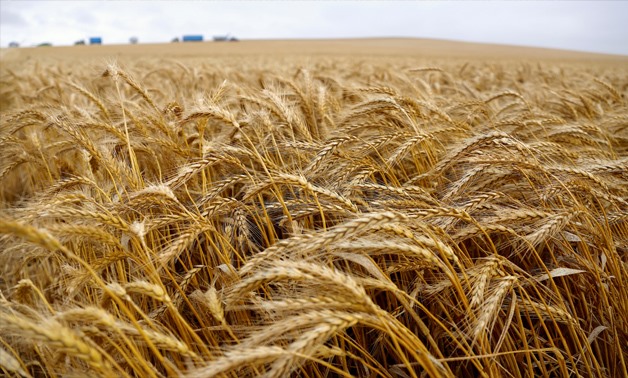Emirati Scientists Create Wheat Variety with ‘Record-Breaking’ 19% Protein

At Sharjah’s Mleiha Wheat Farm, agricultural experts have developed a variety of the grain with 19.3% native protein content, potentially boosting the nation’s food security and exports.
Home to an extreme climate, scarce water resources, and desert conditions, growing food in the UAE is relatively tough work. In fact, less than 2% of the country’s land is arable, which is why 90% of its food supply is imported.
Despite these challenges, the Gulf state might have just had a major breakthrough for its food security and export market. Mleiha Wheat Farm, located in Sharjah, has developed Saba Sanabel (Seven Spikes), a wheat variety with 19.3% protein content – the highest recorded globally.
The farm is in its third year now, and was launched to raise production rates and meet the local food demand. In this latest phase of the project, the high-protein wheat has been cultivated on over 1,400 hectares of desert land using advanced farming technologies. It’s expected to produce 6,000 tonnes of wheat this season.
“Through this project, Sharjah has shown that innovation could overcome even the toughest farming challenges,” said Amna Al Dahak, the national climate change minister.
The wheat farm was initiated by Sheikh Sultan bin Mohammed Al Qasimi, the ruler of Sharjah, to enhance food security by providing high-protein wheat free from chemical fertilisers, pesticides and other potentially harmful substances.
It developed a unique wheat strain labelled Sharjah 1, which is designed to withstand high salinity and drought conditions. A biotech lab sped up the genetic improvement process, evaluating more than 1,450 strains before finding the best-performing varieties.
The high protein content in Saba Sanabel is attributed to the organic farming approach, which helps improve the fertility and content of the soil, and preserves the quality of the wheat grains.
To grow the wheat grains, the farm uses contaminant-free desalinated water for irrigation, which increases the productivity and protein content, because water accelerates the transfer of dry matter from the stems and leaves to the grains, which is crucial for plant development.
In fact, the irrigation system is driven by artificial intelligence (AI), and was identified by Al Dahak as instrumental to the project’s success, given it also reduced water use by 30%.
The crop is only fertilised with natural manure, and has thus earned five quality and safety accreditations, including the HSP food quality certificate and the Made in Emirates label. In addition, the project won the Best Innovation Award for Sustainability in the UAE, a marker of its impact on climate protection and agricultural advancement.
“Sharjah’s wheat has exceeded global standards, making it one of the most nutritionally valuable wheat varieties worldwide,” said Osama Hussein Qambar, an agricultural expert at the Sharjah Department of Agriculture and Livestock.
Mleiha Wheat Farm is equipped with state-of-the-art technologies like satellite thermal imaging (to optimise yield and quality) and a weather monitoring system (to obtain live forecasts and protect crops from fluctuations). “Through this project, Sharjah has shown that innovation could overcome even the toughest farming challenges,” said Al Dahak.
In 2022, when the farm was established, the UAE imported 1.7 million tonnes of wheat, 330,000 tonnes of which were brought into Sharjah. Through this project, the company aims to reduce its wheat imports and bolster its self-sufficiency.
At full capacity, the targeted annual output sits at 15,200 tonnes, which would meet Sharjah’s entire wheat demand. The emirate is looking to export the protein-rich wheat to position itself as a key supplier internationally. In fact, during the third harvest, Sheikh Sultan inaugurated a line of products derived from Saba Sanabel flour, including pasta, vermicelli, croissants, cakes, biscuits, semolina, and traditional Arabic bread.
All this ties into the UAE’s goal to become the world’s most food-secure nation by 2051. The COP28 host initially aimed to break into the top 10 list of the Global Food Security Index by 2021, it ranked 23rd as of 2022.
Nearly a fifth of its population lives below the poverty line, and according to the World Bank, 6% of its citizens are undernourished. And while the country scores high on food availability and safety, it could do better on the sustainability front.
It’s already making moves here, with the new wheat variety giving residents an affordable source of locally grown plant protein. The UAE is home to the Middle East’s most sustainable restaurant, Boca, at a time when research shows that sustainability is an important factor for two-thirds of the country’s diners.
Meanwhile, around 15% of Emiratis want to cut back on meat, and 26% of this group want to replace it with plant-based alternatives. Brands like Switch Foods, Thryve, Nadura* and Arlene are leading the charge with their domestically produced offerings.
For almost 30 years of expertise in the agri markets, UkrAgroConsult has accumulated an extensive database, which became the basis of the platform AgriSupp.
It is a multi-functional online platform with market intelligence for grains and oilseeds that enables to get access to daily operational information on the Black Sea & Danube markets, analytical reports, historical data.
You are welcome to get a 7-day free demo access!!!
Read also
Abbey Commodities – General Partner of BLACK SEA GRAIN.KYIV-2026
Black Sea & Danube Barley Market at a Turning Point: Demand Pressure and Regi...
US Supreme Court rules Trump’s emergency duties illegal
Mercosur: Protective measures for European agriculture
US makes concessions on pulses in new trade deal with India
Write to us
Our manager will contact you soon



